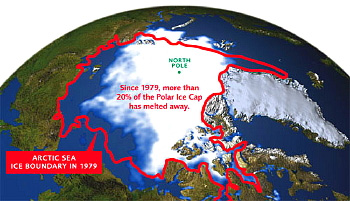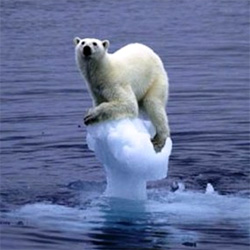Arctic Ice Melt, Psychopathic Capitalism And The Corporate Media.
By David Cromwell and David Edwards.
Climate scientists recently announced that Arctic sea ice had shrunk to its smallest surface area since satellite observations began in 1979. An ice-free summer in the Arctic, once projected to be more than a century away, now looks possible just a few decades from now. Some scientists say it may happen within the next few years.
The loss is hugely significant because Arctic sea ice reflects most solar energy into space, helping to keep the Earth at a moderate temperature. But when the ice melts it reveals dark waters below, which absorb more than 90 per cent of the solar energy that hits them, leading to faster warming both locally and globally.
Peter Wadhams, professor of ocean physics at Cambridge University, warns that the Arctic may be ice-free in summer as soon as 2015. Such a massive loss would have a warming effect roughly equivalent to all human activity to date. In other words, a summer ice-free Arctic could double the rate of warming of the planet as a whole. No wonder that leading NASA climate scientist James Hansen says bluntly: ‘We are in a planetary emergency.’
 In the Scientific American website, Ramez Naam points out that:
In the Scientific American website, Ramez Naam points out that:
‘The reality of changes to the Arctic has far outstripped most predictions. Only a few years ago, in the 2007 Intergovernmental Panel on Climate Change report, the bulk of models showed the Arctic ice cap surviving in summer until well past 2100. Now it’s not clear that the ice will survive in summer past 2020. The level of sea ice we saw this September, in 2012, wasn’t expected by the mean of IPCC models until 2065. The melting Arctic has outpaced the predictions of almost everyone – everyone except the few who were called alarmists.’
As well as global warming from carbon dioxide (CO2), there is the additional risk of warming from methane (CH4) being released into the atmosphere. Huge quantities of methane are locked up in land permafrost. But even vaster quantities exist as methane hydrates frozen below the shallow waters of the Arctic Ocean’s continental shelves. Naam warns:
‘If even 10% of the northern permafrost’s buried carbon were released as methane, it would have a heating effect over the next decade equivalent to ten times all human greenhouse emissions to date, and over the next century equivalent to roughly four times all human greenhouse emissions to date.’
That’s just the methane on land, trapped in the permafrost. If the methane hydrates buried on the Arctic continental shelves were to be released, that would have a warming effect equivalent to hundreds of times the total human carbon emissions to date.
Although Namm says ‘we are probably not in danger of a methane time bomb going off any time soon’, recent observations show that Arctic methane is being released into the atmosphere. And there is scientific controversy over how serious and how rapid this release is: In summary, Naam points to a triple whammy effect:
- Warming from the greenhouse gases we are currently emitting.
- Warming from the loss of ice and permafrost in the Arctic, and the exposure of dark water and dark land below.
- Warming from the release of more carbon into the atmosphere as the permafrost and the Arctic sea floor methane begin to melt.
The situation is already dire. According to a new report commissioned by twenty governments, more than 100 million people will die by 2030 if the world fails to tackle climate change. Five million deaths already occur each year from air pollution, hunger and disease as a result of climate change and carbon-intensive economies. This death toll would likely rise to six million a year by 2030 if current patterns of fossil fuel use continue. More than 90 per cent of those deaths will occur in developing countries.
On a sane planet, action would have been taken long before now to limit the risk. But, as Greenpeace International head Kumi Naidoo notes, fossil fuel industries have been working hard to corrupt the political process:‘Why our governments don’t take action? Because they have been captured by the same interests of the energy industry.’
As we noted in an alert last year, a Greenpeace study titled Who’s Holding Us Back? reported:
‘The corporations most responsible for contributing to climate change emissions and profiting from those activities are campaigning to increase their access to international negotiations and, at the same time, working to defeat progressive legislation on climate change and energy around the world.’
Greenpeace added: ‘These polluting corporations often exert their influence behind the scenes, employing a variety of techniques, including using trade associations and think tanks as front groups; confusing the public through climate denial or advertising campaigns; making corporate political donations; as well as making use of the “revolving door” between public servants and carbon-intensive corporations.’
Unsurprisingly then, meaningful action on tackling climate change is nowhere on the political agenda.
But the record of corporate capitalism shows that powerful industrial forces will do all they can to lobby governments to allow for continued economic exploitation of the planet’s resources. According to U.S Geological Survey, within the Arctic Circle there are some 90 billion barrels of oil – 13 per cent of the planet’s undiscovered oil reserves – and 30 per cent of its undiscovered natural gas. The race for corporate profits is now on, with Shell already committed to a multi year exploration programme in the Arctic.
 Media Malpractice: Corporate media ‘inclusion’ of dissent has deceived the public with the illusion of openness and change, while business-as-usual has taken us very far in the opposite direction. Ironically, meek ‘cooperation’ has handed influence and control to the very forces seeking to dis-empower dissent. And in the absence of serious left/green criticism, corporate media performance has actually deteriorated.
Media Malpractice: Corporate media ‘inclusion’ of dissent has deceived the public with the illusion of openness and change, while business-as-usual has taken us very far in the opposite direction. Ironically, meek ‘cooperation’ has handed influence and control to the very forces seeking to dis-empower dissent. And in the absence of serious left/green criticism, corporate media performance has actually deteriorated.
Why should progressives help this system sell the illusion that the corporate media offers a ‘wide spectrum of views’ when its biased output overwhelmingly and inevitably promotes Permanent War for resources and war on the planet? The corporate media must be confronted with the reality of what it is, and what it has done. It is vital that this be highlighted to the public it has been deceiving.
While the power of the internet remains relatively open, there is a brief window to free ourselves from the shackles of the corporate media and to build something honest, radical, and publicly accountable.
SOURES: Media Lens

